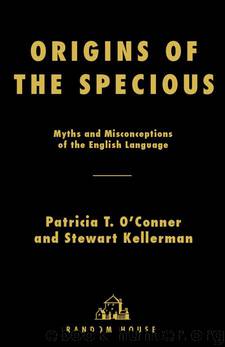Origins of the Specious by O'Conner Patricia T. Kellerman Stewart

Author:O'Conner, Patricia T.,Kellerman, Stewart. [O'Conner, Patricia T.,Kellerman, Stewart.]
Language: eng
Format: mobi, epub
ISBN: 9781588368560
Publisher: Random House Inc.
Published: 2009-09-11T23:00:00+00:00
Don’t Know Much About Herstory
If you’ve seen the musical South Pacific, you’ll remember the on-again, off-again romance between Nellie, the Navy nurse, and Émile, the rich planter. During an off moment, Nellie vows to “wash that man right outa my hair.” Nellie eventually gets her man, but offstage some women have been trying to wash “man” right out of the feminist lexicon. So we find a student house at Beloit College called the Womyn’s Center; an FM station in California with a Wimmin’s Music Program; a Canadian musical group named the Dorchester Wymyn Drummers, and an Iowa social-service group, the Rainbow wYmYn’s Circle.
We can trace this lexical inventiveness back to the late 1960s and early ’70s, when some feminists began playfully altering the spellings of a few common words to remove real or fanciful traces of maleness. They gleefully took etymological liberties to lay siege to—and poke fun at—the boys’ club orientation of history and language. So “history,” retold from a woman’s point of view, became “herstory.” The word “women” became “womyn” and “wimmin.” Before long we had “wymyn,” “womben,” “womon,” “womin,” and other whimsies. Meanwhile, some females gave up “female” in favor of “femina” or “femelle.” And cheeky girls turned “girls” inside out, calling themselves “grrrls,” “gurls,” “grrlz,” and so on.
To be fair, the feminist writers who started all this were making a political, not an etymological, statement. But politics, as we know, has a way of twisting etymology to its own ends. A lot of younger womyn who use these creative spellings today mistakenly believe that the “his” in “history” really has something to do with maleness, that “female” is derived from “male,” and that “woman” is sexist because it includes the word “man.”
First a little herstory. I’m not a big fan of this word, but I’d better get used to it. You should too, since “herstory” has earned a place in dictionaries and is now standard English. Lexicographers describe it as a blend of “her” and “history,” circa 1970. It’s usually defined as history told from a feminist viewpoint or emphasizing the contributions of women. Instead of making up a new word, though, I’d rather see history do the job it’s supposed to do—tell women’s stories as well as men’s. Besides, there’s nothing masculine about the word “history,” no matter how many websites make claims to the contrary. The “his” in “history” is not the masculine pronoun that’s the opposite of “her.” We got the word from the Latin historia, which means an “account” or “narrative,” and the Romans got it from a similar word in Greek. No pronouns here, male or otherwise.
Which brings us to “female.” We can thank the Romans for this one too. We got it from the Latin femella, a diminutive form of femina, or “woman.” Here again, no maleness intended. Femella was strictly a female female. When the word entered English in the early 1300s it was spelled “femelle,” similar to a word in Old French. This spelling was short-lived, however. By
Download
Origins of the Specious by O'Conner Patricia T. Kellerman Stewart.epub
This site does not store any files on its server. We only index and link to content provided by other sites. Please contact the content providers to delete copyright contents if any and email us, we'll remove relevant links or contents immediately.
Cecilia; Or, Memoirs of an Heiress — Volume 1 by Fanny Burney(32527)
Cecilia; Or, Memoirs of an Heiress — Volume 2 by Fanny Burney(31928)
Cecilia; Or, Memoirs of an Heiress — Volume 3 by Fanny Burney(31916)
The Lost Art of Listening by Michael P. Nichols(7476)
Asking the Right Questions: A Guide to Critical Thinking by M. Neil Browne & Stuart M. Keeley(5740)
We Need to Talk by Celeste Headlee(5596)
On Writing A Memoir of the Craft by Stephen King(4915)
Dialogue by Robert McKee(4374)
Pre-Suasion: A Revolutionary Way to Influence and Persuade by Robert Cialdini(4194)
I Have Something to Say: Mastering the Art of Public Speaking in an Age of Disconnection by John Bowe(3864)
Elements of Style 2017 by Richard De A'Morelli(3331)
The Book of Human Emotions by Tiffany Watt Smith(3282)
Fluent Forever: How to Learn Any Language Fast and Never Forget It by Gabriel Wyner(3066)
Name Book, The: Over 10,000 Names--Their Meanings, Origins, and Spiritual Significance by Astoria Dorothy(2962)
Why I Write by George Orwell(2933)
Good Humor, Bad Taste: A Sociology of the Joke by Kuipers Giselinde(2931)
The Art Of Deception by Kevin Mitnick(2781)
The Grammaring Guide to English Grammar with Exercises by Péter Simon(2728)
Ancient Worlds by Michael Scott(2660)
